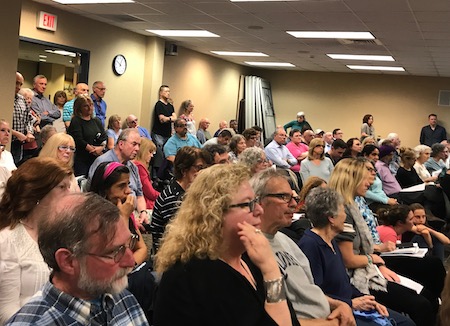 This July 4th, as we celebrate our independence, residents of Nyack can also applaud the fact that we have public control over our water supply. In Clarkstown, our neighbors have been doing battle with Suez Water Company, a monopoly utility that controls the flow of water. An ill-conceived desalinization proposal was defeated, but public opposition to their efforts to relocate their headquarters to a site uphill from a regional water source, Lake DeForest, continues. And then there’s the 18.6% rate increase Suez has requested from the Public Service Commission.
This July 4th, as we celebrate our independence, residents of Nyack can also applaud the fact that we have public control over our water supply. In Clarkstown, our neighbors have been doing battle with Suez Water Company, a monopoly utility that controls the flow of water. An ill-conceived desalinization proposal was defeated, but public opposition to their efforts to relocate their headquarters to a site uphill from a regional water source, Lake DeForest, continues. And then there’s the 18.6% rate increase Suez has requested from the Public Service Commission.
Excerpt from Earth Matters:
The Suez Saga and Why You Care
By Susan Hellauer
Suez announced plans to relocated their headquarters from 360 Clarkstown Road, in West Nyack, to a 26-acre site at 162 Old Mill Road, in Valley Cottage, leased from Tilcon.
Local residents, along with the county’s most diligent water-watchers were present at three recent meetings of the Clarkstown Planning Board, which needs to review and decide whether to green light Suez’s plan. Concerned citizens voiced objections to removal of 270+ mature trees, as well as to asphalt paving of extensive parking areas, increased traffic, a pair of on-site fuel storage tanks, and a diesel generator. All of these parts of the plan could create both everyday pollution in the reservoir from stormwater runoff, and a disaster for the county’s drinking water in a superstorm. Suez agreed to nix the above-ground fuel-storage tanks, but public comment at these meetings harped on the same refrain: Find a better place for all this stuff!
The process is now stalled in a disagreement over the generator, a traffic study of local roads, and the need—or not—for a State Environmental Site Assessment.
By Susan Hellauer
Nyack Sketch Log Suggestion!
Contact Clarkstown Supervisor George Hoehmann and ask that he does everything in his power to make sure that Suez Water Company acts responsibly in their capacity as the steward of Lake DeForest.
You can reach Supervisor Hoehmann at g.hoehmann@clarkstown.org
or (845)639-2050
The overreach and arrogance that Suez has shown toward local government and rate payers should only redouble the resistance of those who live in Nyack to even consider the privatization of the life giving and sustaining resource of water.
Here’s a short history of the Nyack Water Department and an update on the status of the Suez Lake DeForest site building permit process.
The Source of our Water
When we turn on the faucet or flush the toilet, the water always flows. We may not know the exact source, or where the mains and pipes are buried, but we can reliably depend on the quality and availability of water in our village. Nyack is fortunate to have a publicly controlled water department that has met our needs for 116 years.
From 18th century cisterns to the controversy over fluoridation, from political intrigue in the Leonard Cooke era to the desalination proposal of Suez Water (formerly United Water,) here is brief history of the water supply in Nyack.
Hackensack River
Our water is drawn from the Hackensack River after it passes through Lake Deforest Reservoir. The reservoir has a capacity of five billion gallons. The water filtration plant that treats our water is operated by the Nyack Water Department and is located approximately one mile from the reservoir in West Nyack.
For ten years my father, William Prime Batson, worked for the Nyack Water Department, which supplies water to Nyack, South Nyack, Central Nyack and part of West Nyack. (Currently, I live in Upper Nyack and make a monthly payment to Suez Water.)

Nyack uses approximately 1.5 million gallons of water per day. This number rises in the summer and drops in the winter.
The treatment plant cost one million dollars to construct when it was built in 1970.
Cooke named, unnamed and renamed
Leonard Cooke, an African American civic leader, was the chairman of the Nyack Water Department when the treatment plant was constructed. Cooke was widely recognized for securing a grant of over a half a million dollars from the US Dept of Housing and Urban Development that made the project possible. The deal was negotiated between Cooke and HUD Secretary Robert Weaver, the first African American cabinet member. Cooke and Weaver first met through their work with the NAACP.
 Although the plant was named for Cooke when it opened in 1970, the Nyack Village Board removed his name from the building and refused to reappoint Cooke, a long time Democratic Committeeman, when a newly elected Republican majority assumed control of the Village Board in 1973.
Although the plant was named for Cooke when it opened in 1970, the Nyack Village Board removed his name from the building and refused to reappoint Cooke, a long time Democratic Committeeman, when a newly elected Republican majority assumed control of the Village Board in 1973.
In a subsequent electoral cycle, Cooke was returned to his position and his name restored to the filtration plant.
From Private to Public to Almost Private Again
The Honorable William Voorhis chartered the Nyack Water Works Company on March 28, 1873. At first, the company provided water from springs and wells. As demand grew the water company added capacity with three reservoirs. Eventually, population growth required the construction of a steam powered pump house to take water from the Hackensack River near the location of today’s treatment plant.
 Before Voorhis, water was obtained through wells that were sometimes shared with neighbors or cisterns that collected rainwater. Many health and conservation conscious people today are promoting a return to the cistern.
Before Voorhis, water was obtained through wells that were sometimes shared with neighbors or cisterns that collected rainwater. Many health and conservation conscious people today are promoting a return to the cistern.
The village established the Nyack Water Department after using eminent domain to purchase the Nyack Water Works Company from the heirs of Voorhis in 1896 for $107,000.
In the early 1960’s, the Nyack Civic Association, with Leonard Cooke at the vanguard, successfully fought off efforts to sell Nyack’s water supply to the Spring Valley Water and Supply Company. Opponents argued that the sale would drive up rates. Spring Valley Water was eventually taken over by United Water.
To fluoridate or not to fluoridate
 In 1980, Nyack failed to comply with a Rockland County Health Department mandate to fluoridate the water supply. Ignoring pleas from then Mayor Alex Caglione, the Village Board refused to approve fluoridation. Legal maneuvering ensued, but the Village Board eventually prevailed.
In 1980, Nyack failed to comply with a Rockland County Health Department mandate to fluoridate the water supply. Ignoring pleas from then Mayor Alex Caglione, the Village Board refused to approve fluoridation. Legal maneuvering ensued, but the Village Board eventually prevailed.
In Stanly Kubrick’s epic work of political satire, Dr. Strangelove, a deranged General Jack D. Ripper, suggests fluoridation was a communist plot. I am not sure that Kubrick and Ripper are to blame for our fluoride free water, but the wound of the battle is still evident. In a Q & A on the Rockland County Department of Health the question, “is my water fluoridated,”is answered: NO!
Desalination
The safety of our water supply made headlines when sides were drawn over Suez 2012 (then United Water) plan to open a desalination plant on the Hudson River in Haverstraw.
 According to the Nyack Water Department, Nyack residents would not consume desalinated water if the plan were adopted because our water supply is separate from the United Water system. However, during emergencies, we do rely on United Water’s reservoir.
According to the Nyack Water Department, Nyack residents would not consume desalinated water if the plan were adopted because our water supply is separate from the United Water system. However, during emergencies, we do rely on United Water’s reservoir.
The Rockland Water Coalition argued that the adverse health effects from exposure to desalinated water are not the only issue for the people of Nyack. The generation of unlimited river water through desalination would spur over development jeopardizing our water supply through increased pollution and run off.
There was also concern about the environmental impact of a desalination plant. There is concern over how the removal of millions of gallons of water per day for desalination will impact the Hudson River. Haverstraw Bay is a major nursery for many species, some of which are endangered. Finally, the large amounts of electricity required to power the plant will pollute the air and warm the globe.
In December 2015, the NYS Public Service Commission agreed with the activists and said the plant was no longer needed, directing Suez, the company formerly known as United Water to focus, on conservation instead of desalination.
To keep informed about the unfolding Suez saga, visit the Sierra Club.
Thanks to Brian Jennings, the Librarian Supervisor at the Nyack Library for his time, energy and insight. Special thanks to Win Perry and Harry Williams, Nyack Water Department Superintendent.
An artist and writer, Bill Batson lives in Nyack, NY. Nyack Sketch Log: “Nyack Water Department” © 2019 Bill Batson. Visit billbatsonarts.com to see more.










